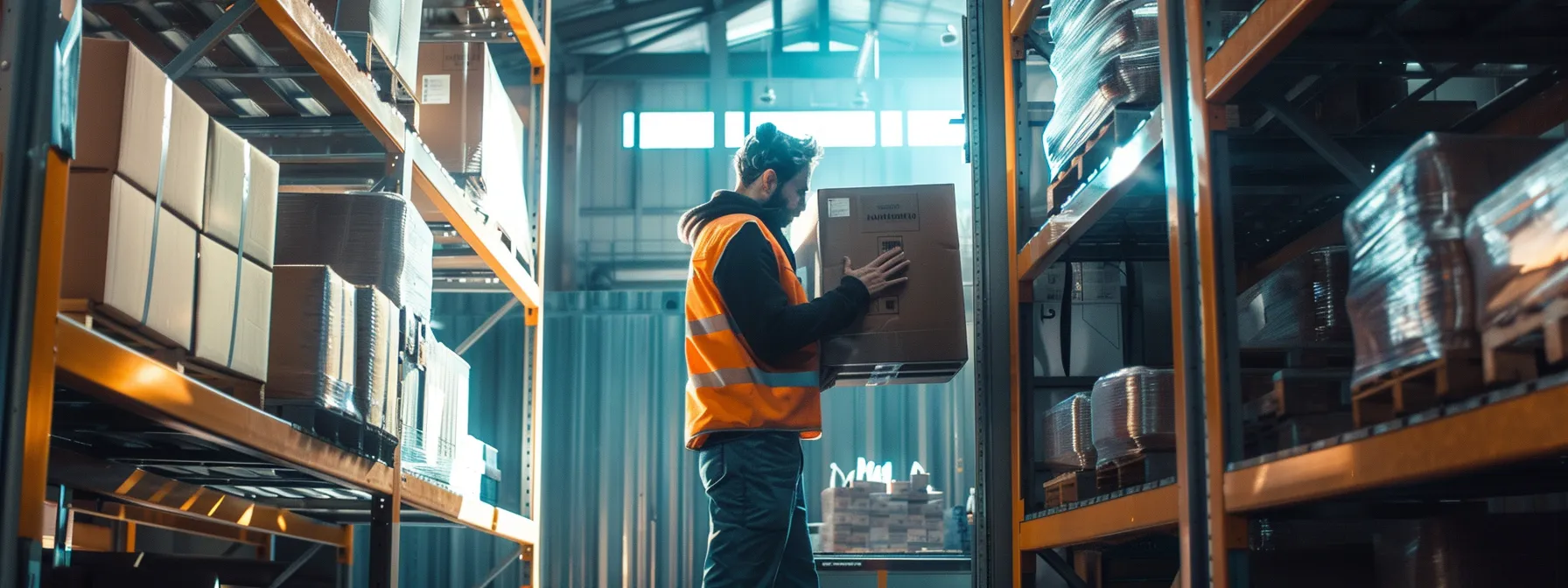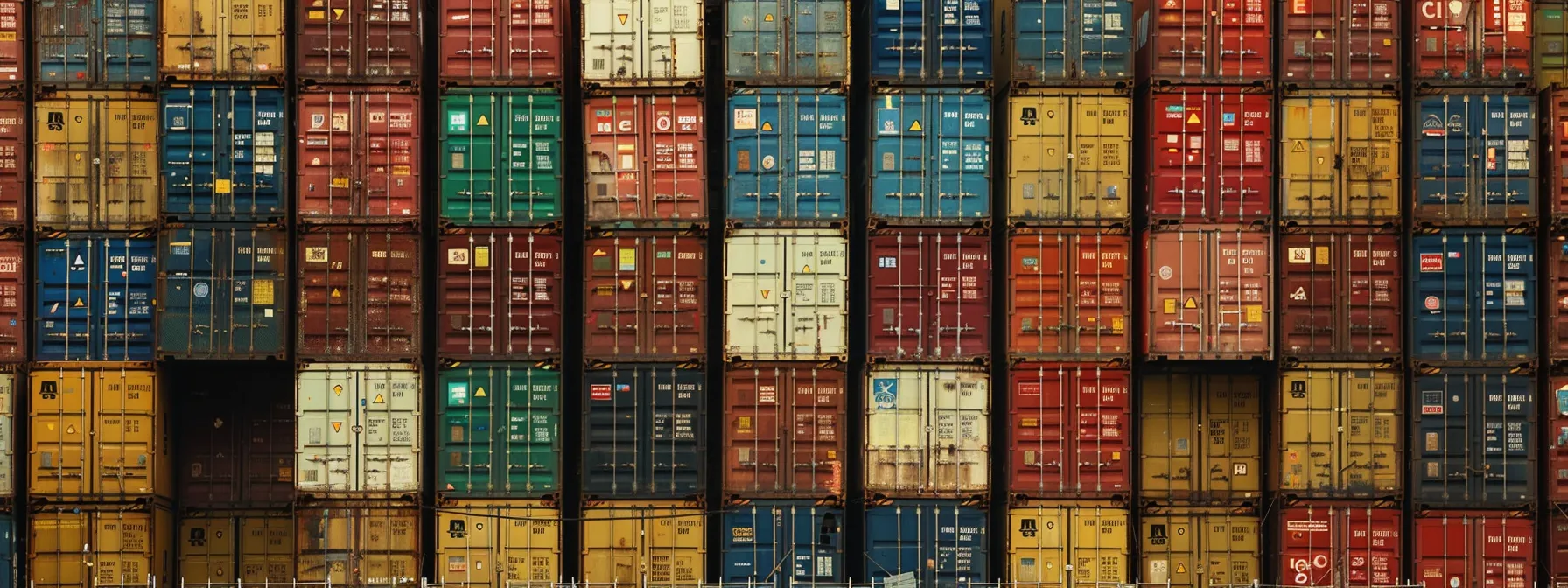The freight and logistics industry is undergoing significant changes. How can your business keep up with these emerging trends? This article explores key developments reshaping the sector, including technological innovations, sustainability efforts, and e-commerce growth.
We’ll discuss how these trends impact cargo transport, air cargo operations, and truckload shipping. By understanding these shifts, freight forwarders and logistics companies can adapt their strategies to stay competitive and meet evolving customer demands.
Key Takeaways
- Technological advancements are transforming freight and logistics operations, improving efficiency and transparency
- Sustainability initiatives are becoming crucial in the industry to reduce environmental impact
- E-commerce growth is driving innovation in last-mile delivery and reverse logistics management
- Data analytics is revolutionizing demand forecasting, operations optimization, and customer experience in logistics
- Workforce development and diversity initiatives are addressing skills gaps in the evolving logistics industry
Embracing Technological Innovations in Logistics

The freight and logistics industry is undergoing a technological revolution. Automation and robotics are transforming warehousing, while artificial intelligence enhances supply chain efficiency. Real-time tracking with Internet of Things devices improves visibility, and blockchain secures logistics transactions.
These innovations, along with transportation management systems and international Air Transport Association standards, are reshaping outsourcing and our services practices.
Automation and Robotics Transforming Warehousing
Automation and robotics are revolutionizing warehouse operations in the logistics industry. Advanced robotics systems handle tasks such as inventory management, order picking, and packaging with unprecedented speed and accuracy.
These technologies streamline the supply chain process, reducing errors and improving overall efficiency in customs clearance and order fulfillment.
The integration of automated guided vehicles (AGVs) and collaborative robots in warehouses enhances productivity and safety. These smart machines work alongside human employees, optimizing space utilization and reducing the physical strain on workers.
As a result, logistics companies can process higher volumes of goods, meet airline cargo deadlines more effectively, and maintain a competitive edge in the rapidly evolving global supply chain landscape.
Artificial Intelligence Enhancing Supply Chain Efficiency
Artificial intelligence (AI) is revolutionizing supply chain efficiency in the freight and logistics industry. our Instagram-powered systems analyze vast amounts of data to optimize route planning for trucks, enhancing sustainability efforts and reducing fuel consumption across North America.
These intelligent algorithms also improve aviation logistics by predicting potential disruptions and suggesting alternative solutions.
AI-driven customer service chatbots provide real-time support, addressing inquiries and tracking shipments efficiently. By leveraging machine learning, logistics companies can forecast demand more accurately, enabling better inventory management and reducing waste.
This technology not only streamlines operations but also contributes to overall sustainability goals in the industry.
Real-Time Tracking With Internet of Things Devices
The Internet of Things (IoT) has revolutionized real-time tracking in the freight and logistics industry. IoT devices attached to aircraft, ships, and goods provide continuous location updates and vital data on cargo conditions.
This enhanced visibility enables efficient management of shipments across various modes of transportation, optimizing revenue streams for logistics companies.
Real-time tracking through IoT devices offers numerous benefits to the logistics sector:
- Improved inventory management and reduced losses
- Enhanced security and theft prevention
- Optimized route planning and fuel efficiency
- Proactive maintenance scheduling for vehicles and equipment
- Better customer service through accurate delivery estimates
By leveraging IoT technology, logistics providers can offer clients unprecedented transparency and control over their shipments. This level of visibility not only improves operational efficiency but also enhances customer satisfaction, ultimately driving revenue growth in the competitive logistics market.
Blockchain Securing Logistics Transactions
Blockchain technology is revolutionizing logistics transactions by providing a secure, transparent, and immutable ledger for tracking goods and data across the supply chain.
This innovation enhances the handling of dangerous goods and streamlines export processes, ensuring compliance with regulations and reducing the risk of fraud. Companies like DSV are leveraging blockchain to create tamper-proof records of shipments, improving traceability and accountability in road transport and international trade.
The implementation of blockchain in logistics offers significant benefits for stakeholders:
| Benefit | Description |
|---|---|
| Enhanced Security | Cryptographic protection of transaction data |
| Improved Efficiency | Streamlined documentation and customs clearance |
| Real-time Visibility | Instant access to shipment status and location |
| Cost Reduction | Elimination of intermediaries and paperwork |
Advancing Sustainability in Freight Operations

The freight and logistics industry is prioritizing sustainability in response to environmental concerns and regulations. This section explores eco-friendly transportation methods reducing emissions, green initiatives in logistics processes, and compliance with environmental regulations.
These efforts impact various modes of transport, including air charter, and require business intelligence to optimize customer service while maintaining manufacturing efficiency.
Eco-Friendly Transportation Methods Reducing Emissions
The freight and logistics industry is embracing eco-friendly transportation methods to reduce emissions and promote sustainable international trade. Companies are investing in electric and hydrogen-powered vehicles for full truckload shipments, significantly decreasing carbon footprints.
These innovative solutions not only address environmental concerns but also offer long-term cost savings for freight operators.
Uber Freight and similar platforms are revolutionizing the industry by optimizing route planning and reducing empty miles, thus minimizing fuel consumption and emissions.
By leveraging advanced algorithms, these technologies match shippers with carriers more efficiently, ensuring fuller loads and fewer wasted trips. This approach not only benefits the environment but also improves the overall efficiency of freight operations:
| Eco-Friendly Method | Impact on Emissions | Additional Benefits |
|---|---|---|
| Electric Vehicles | Zero direct emissions | Lower operating costs |
| Hydrogen Fuel Cells | Water vapor as only byproduct | Faster refueling times |
| Optimized Route Planning | Reduced fuel consumption | Improved delivery times |
| Load Matching Technology | Fewer empty miles | Increased profitability |
Implementing Green Initiatives in Logistics Processes
Logistics service providers are implementing green initiatives to reduce their environmental impact and improve supply chain solutions. These companies are adopting energy-efficient warehousing practices, utilizing renewable energy sources, and optimizing packaging to minimize waste.
By integrating these eco-friendly processes, logistics services can offer clients more sustainable options while maintaining competitive freight quotes.
The ease of implementing green initiatives has improved with advanced technology and innovative approaches. Logistics providers are investing in electric vehicle fleets for last-mile deliveries and using data analytics to optimize route planning, reducing fuel consumption and emissions.
These sustainable practices not only benefit the environment but also enhance operational efficiency, ultimately leading to cost savings that can be passed on to clients through more attractive freight quotes.
Complying With Environmental Regulations
Freight shipping services must comply with increasingly stringent environmental regulations to reduce their ecological footprint. International freight companies are adopting cleaner technologies and optimizing their operations to meet emissions standards set by global organizations.
This compliance often requires significant investments in fleet upgrades and process improvements, which can impact freight quotes but ultimately lead to more sustainable and efficient transportation solutions.
Ocean freight companies and international air freight providers are particularly focused on adhering to regulations such as the International Maritime Organization’s (IMO) sulfur cap and the Carbon Offsetting and Reduction Scheme for International Aviation (CORSIA).
These measures push the industry towards cleaner fuels and more efficient practices, encouraging freight forwarders near me to offer environmentally responsible options to their clients. By prioritizing compliance, logistics providers ensure long-term sustainability while meeting the growing demand for eco-friendly shipping alternatives.
Navigating the E-Commerce Growth Impact

The e-commerce boom has reshaped the freight and logistics industry, presenting new challenges and opportunities for freight forwarders and air cargo shipping companies.
This section explores strategies for overcoming last-mile delivery hurdles, implementing same-day and on-demand services, and efficiently managing reverse logistics. Air freight companies must adapt to these trends to remain competitive in the evolving market.
Overcoming Challenges in Last-Mile Delivery
Cargo freight forwarders and air forwarding companies face significant challenges in last-mile delivery due to the rapid growth of e-commerce. To overcome these hurdles, logistics providers are leveraging advanced analytics to optimize route planning and delivery schedules.
This data-driven approach enables companies to offer instant quotes and improve efficiency, reducing costs and enhancing customer satisfaction.
MSC and other major logistics players are investing in innovative solutions to address last-mile delivery issues. These include the use of autonomous vehicles, drones, and smart lockers to streamline the final stage of delivery.
By adopting these technologies, freight forwarders can better manage the increasing demand for fast, reliable deliveries while maintaining competitive pricing and service quality.
Implementing Same-Day and on-Demand Delivery Services
International freight forwarders are adapting to the demands of e-commerce by implementing same-day and on-demand delivery services. These companies leverage their extensive networks of ports and cargo airlines to expedite shipments, ensuring rapid turnaround times for time-sensitive goods.
By optimizing their logistics processes, forwarders can offer competitive costs while meeting the growing consumer expectations for swift delivery.
To facilitate same-day and on-demand services, logistics providers are investing in advanced vehicle tracking systems and route optimization algorithms. These technologies enable real-time adjustments to delivery schedules, allowing forwarders to maximize efficiency and minimize transit times.
As a result, businesses can offer their customers faster shipping options without significantly increasing operational costs, maintaining a competitive edge in the rapidly evolving e-commerce landscape.
Managing Reverse Logistics and Returns
Reverse logistics and returns management have become crucial for ocean freight companies as e-commerce growth drives increased product returns. Mediterranean Shipping Company and other major players are investing in advanced warehouse management systems to streamline the reverse logistics process.
These systems enable efficient sorting, restocking, and recycling of returned items, minimizing costs and environmental impact.
To handle the complexities of reverse logistics, companies are developing dedicated infrastructure for returns processing. This includes specialized facilities equipped with automated sorting technology and quality control measures.
By optimizing reverse logistics operations, freight providers can offer value-added services to e-commerce clients, such as refurbishment and resale of returned products, creating new revenue streams and enhancing customer satisfaction.
Adapting to Global Trade and Supply Chain Changes

Global trade and supply chain dynamics are evolving rapidly, requiring freight and logistics companies to adapt. This section explores how firms adjust to international trade policy shifts, mitigate risks from geopolitical events, and diversify supply sources and routes.
These strategies are crucial for maintaining efficient operations in the United States, Europe, and beyond, driving innovation in charter services and contract management.
Adjusting to International Trade Policy Shifts
Freight and logistics companies are adapting to international trade policy shifts by enhancing visibility across their supply chains. This increased transparency allows them to quickly adjust inventory levels and trailer utilization in response to changing regulations, particularly those affecting trade with Asia.
By leveraging advanced tracking technologies, these firms can optimize their retail distribution networks and maintain efficient operations despite policy fluctuations.
To navigate the complexities of evolving trade policies, logistics providers are diversifying their routes and transportation modes. This strategy helps mitigate risks associated with sudden policy changes, ensuring consistent service for retail clients.
Companies are also investing in data analytics to predict potential policy impacts on inventory management, enabling proactive decision-making and maintaining competitive advantage in the global marketplace.
Mitigating Supply Chain Risks From Geopolitical Events
Freight and logistics companies are mitigating supply chain risks from geopolitical events through strategic mergers and acquisitions. These consolidations enable firms to diversify their operations across multiple regions, including Mexico, reducing vulnerability to localized disruptions.
By leveraging advanced technology, companies enhance their ability to monitor global events and swiftly adapt their drayage operations to maintain seamless customer experiences.
To further safeguard against geopolitical risks, logistics providers are investing in robust data analytics platforms. These tools help predict potential disruptions and optimize alternative routes, ensuring continuous service even during turbulent times.
By prioritizing adaptability and leveraging technology, freight companies can maintain consistent performance and deliver superior customer experiences despite geopolitical challenges.
Diversifying Supply Sources and Routes
Freight and logistics companies are diversifying supply sources and routes to mitigate risks associated with global trade uncertainties. Investments in rail transport infrastructure have increased, offering alternative shipping options to traditional sea and air freight.
This diversification strategy helps companies navigate tariff changes and geopolitical tensions, ensuring more stable supply chains.
Brokers play a crucial role in identifying new supply sources and routes, particularly in emerging markets like Saudi Arabia. By expanding their network of suppliers and transportation options, logistics providers can offer clients more flexibility and resilience in their supply chains.
This approach allows companies to adapt quickly to changing market conditions and maintain competitive advantage:
| Diversification Strategy | Benefits | Challenges |
|---|---|---|
| Multiple Supply Sources | Reduced dependency on single regions | Quality control across suppliers |
| Alternative Transport Modes | Flexibility during disruptions | Infrastructure development costs |
| Emerging Market Expansion | Access to new growth opportunities | Navigating local regulations |
| Broker Partnerships | Expert market insights | Managing multiple relationships |
Leveraging Data Analytics for Strategic Decisions

Data analytics is revolutionizing freight and logistics, enabling companies like DHL Supply Chain to make strategic decisions. This section explores how predictive analytics optimizes demand forecasting, big data integration enhances operations, and data insights improve customer experience.
From fuel efficiency to streamlined bill-of-lading processes in Abu Dhabi, data-driven approaches are transforming delivery services across the industry.
Utilizing Predictive Analytics for Demand Forecasting
Predictive analytics has transformed demand forecasting in the freight and logistics industry, enabling companies like ArcBest Freight to optimize their operations.
By leveraging historical data and advanced algorithms, freight brokerage companies can accurately predict shipping volumes, allowing for more efficient resource allocation and improved customer service. This knowledge-driven approach helps truck brokers near me to anticipate market fluctuations and adjust their strategies accordingly.
The implementation of predictive analytics in demand forecasting has led to significant energy savings and cost reductions across the supply chain. Logistics providers can now optimize their fleet utilization, reducing empty miles and minimizing fuel consumption.
This data-driven approach not only enhances operational efficiency but also contributes to sustainability efforts, aligning with the growing demand for eco-friendly transportation solutions in the freight industry.
Integrating Big Data Into Logistics Operations
International shipping services and freight logistics companies are integrating big data into their operations to optimize performance and enhance decision-making. XPO LTL, for instance, utilizes advanced analytics to streamline routing, improve load planning, and predict potential disruptions in the supply chain.
This data-driven approach enables logistics providers to offer more efficient and cost-effective solutions to their clients, particularly for international cargo shipping near me.
Air cargo logistics has seen significant improvements through the integration of big data, with companies leveraging real-time information to optimize aircraft utilization and reduce turnaround times.
By analyzing vast amounts of data from various sources, including weather patterns, flight schedules, and cargo manifests, these companies can make informed decisions that improve operational efficiency and customer satisfaction. The benefits of integrating big data into logistics operations include:
- Enhanced route optimization and fuel efficiency
- Improved inventory management and demand forecasting
- Reduced transit times and increased on-time deliveries
- Better risk management and proactive problem-solving
- Personalized customer experiences through data-driven insights
Enhancing Customer Experience Through Data Insights
Air cargo freight forwarders are leveraging data insights to enhance customer experience by providing real-time tracking and personalized service. These freight forwarder air companies utilize advanced analytics to predict potential delays, allowing them to proactively communicate with clients and offer alternative solutions.
By analyzing historical data and current market trends, air cargo and logistics providers can optimize routing and pricing strategies, ensuring competitive rates and faster delivery times for their customers.
Airways logistics firms are implementing data-driven customer relationship management systems to tailor their services to individual client needs. These systems enable air cargo forwarding companies to anticipate customer requirements, streamline communication, and offer targeted value-added services.
By harnessing the power of data insights, logistics providers can create a more seamless and efficient experience for their clients, from initial quote to final delivery, ultimately fostering long-term customer loyalty and driving business growth.
Transforming the Logistics Workforce

The freight and logistics industry is transforming its workforce to meet evolving demands. Companies like Alkeba Logistics are addressing skills gaps through specialized training, promoting diversity and inclusion, and adapting to remote work and digital collaboration.
These changes are reshaping how air logistics and Chinese freight forwarders operate, enhancing services and competitiveness in the global market.
Addressing the Skills Gap With Specialized Training
Freight and logistics companies are addressing the skills gap through specialized training programs tailored to the industry’s evolving needs.
These programs focus on developing expertise in emerging technologies, data analytics, and supply chain management, ensuring employees are equipped to handle the complexities of modern logistics operations.
By investing in workforce development, companies enhance their operational efficiency and maintain a competitive edge in the rapidly changing market.
To showcase their commitment to employee growth, many logistics firms share training success stories on their Instagram accounts. This approach not only attracts potential talent but also demonstrates the industry’s dedication to continuous learning and professional development.
By leveraging social media platforms, companies can highlight the diverse career paths available in logistics and inspire the next generation of industry professionals.
Promoting Diversity and Inclusion in the Industry
The freight and logistics industry is actively promoting diversity and inclusion to foster innovation and enhance decision-making. Companies are implementing targeted recruitment strategies to attract talent from diverse backgrounds, including women and underrepresented minorities.
This approach not only broadens the industry’s talent pool but also brings fresh perspectives to tackle complex supply chain challenges.
To support diversity initiatives, logistics firms are establishing mentorship programs and employee resource groups. These efforts create a more inclusive work environment, encouraging collaboration and knowledge sharing across different cultural and professional backgrounds.
By prioritizing diversity and inclusion, the industry is better positioned to serve a global customer base and adapt to evolving market demands.
Adapting to Remote Work and Digital Collaboration
Freight and logistics companies are rapidly adapting to remote work and digital collaboration models. These firms are leveraging cloud-based platforms and advanced communication tools to maintain seamless operations across dispersed teams. This shift has enabled logistics providers to access a wider talent pool, reduce overhead costs, and enhance operational flexibility.
To facilitate effective remote work, logistics companies are investing in robust cybersecurity measures and digital training programs. These initiatives ensure that sensitive shipment data remains protected while employees gain the necessary skills to thrive in a digital work environment. The transition to remote work has also prompted companies to reimagine their office spaces, creating hybrid models that balance in-person collaboration with remote productivity:
| Remote Work Benefits | Implementation Challenges | Solutions |
|---|---|---|
| Increased workforce flexibility | Maintaining team cohesion | Regular virtual team-building activities |
| Reduced operational costs | Ensuring data security | Advanced encryption and VPN usage |
| Access to global talent | Time zone differences | Asynchronous communication tools |
| Improved work-life balance | Performance monitoring | Goal-oriented management approaches |
Frequently Asked Questions
How are technological innovations reshaping the freight and logistics industry?
Technological innovations are revolutionizing freight and logistics through automated warehousing, AI-powered route optimization, blockchain for enhanced transparency, and IoT devices for real-time tracking. These advancements improve efficiency, reduce costs, and enhance customer satisfaction in the rapidly evolving industry.
What sustainability measures are being implemented in freight operations?
Freight operations are adopting eco-friendly practices like fuel-efficient vehicles, route optimization, and alternative energy sources. Companies are also implementing paperless systems, recycling programs, and sustainable packaging to reduce environmental impact and meet regulatory requirements.
How is the growth of e-commerce impacting logistics services?
E-commerce growth has significantly impacted logistics services, driving demand for faster shipping, last-mile delivery solutions, and advanced inventory management. Logistics providers are adapting by investing in technology, expanding warehousing capabilities, and optimizing supply chains to meet the increasing expectations of online shoppers.
How are global trade changes affecting supply chain management?
Global trade changes are significantly impacting supply chain management. Tariffs, geopolitical tensions, and shifting regulations are forcing companies to reassess their sourcing strategies, diversify suppliers, and implement more agile logistics solutions. These disruptions require increased flexibility and risk management in supply chain operations.
How is data analytics transforming decision-making in logistics?
Data analytics in logistics enables more informed decision-making by providing real-time insights into supply chain operations, inventory management, and route optimization. This technology helps companies reduce costs, improve efficiency, and enhance customer satisfaction through data-driven strategies and predictive modeling.
Conclusion
The freight and logistics industry is undergoing a profound transformation driven by technological innovations, sustainability initiatives, and evolving global trade dynamics. From automation and AI to blockchain and IoT, these advancements are revolutionizing operations, enhancing efficiency, and improving customer experiences across the supply chain.
The industry’s adaptation to e-commerce growth, environmental regulations, and geopolitical challenges highlights its resilience and commitment to meeting changing market demands. As companies leverage data analytics and foster a diverse, skilled workforce, they are not only optimizing current processes but also paving the way for a more agile, sustainable, and customer-centric future in freight and logistics.
